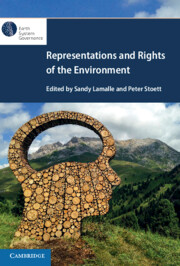Book contents
- Representations and Rights of the Environment
- Series page
- Representations and Rights of the Environment
- Copyright page
- Dedication
- Epigraph
- Contents
- Illustrations
- Tables
- Contributors
- Preface
- Acknowledgements
- 1 An Introduction
- Part I Challenges
- Part II Recollection
- 6 Traditional Indigenous Knowledge and the Relationship to Mother Earth
- 7 The Encyclical Letter Laudato si’ of Pope Francis
- 8 Persons, Things and Nature in Roman Law
- 9 Environmental Law
- Part III Perspectives
- Index
- References
8 - Persons, Things and Nature in Roman Law
Reflections on Legal History
from Part II - Recollection
Published online by Cambridge University Press: 16 March 2023
- Representations and Rights of the Environment
- Series page
- Representations and Rights of the Environment
- Copyright page
- Dedication
- Epigraph
- Contents
- Illustrations
- Tables
- Contributors
- Preface
- Acknowledgements
- 1 An Introduction
- Part I Challenges
- Part II Recollection
- 6 Traditional Indigenous Knowledge and the Relationship to Mother Earth
- 7 The Encyclical Letter Laudato si’ of Pope Francis
- 8 Persons, Things and Nature in Roman Law
- 9 Environmental Law
- Part III Perspectives
- Index
- References
Summary
Roman law is often considered as an intellectual matrix of contemporary laws and in particular French civil law. However, even if the vocabulary persisted, some legal concepts went through great changes across history as law was step by step related to a subject’s power. The notion of ‘thing’ originally meant the trial, the case, the litigious situation managed by the legal process. In this way, the thing was understood as a res iuris. In contemporary law systems, the thing (res as a legal category) ordinarily specifies some goods on which the subject applies his property power. This view is understandable considering the evolution due to the theorisation of subjective law which led to the promotion of a strong and exclusive separation between persons and things, while Roman law could imbricate these legal categories. This difficulty is at the heart of the problem when jurists aim to categorise Nature in legal taxonomy.
Keywords
- Type
- Chapter
- Information
- Representations and Rights of the Environment , pp. 184 - 205Publisher: Cambridge University PressPrint publication year: 2023
References
- 1
- Cited by

